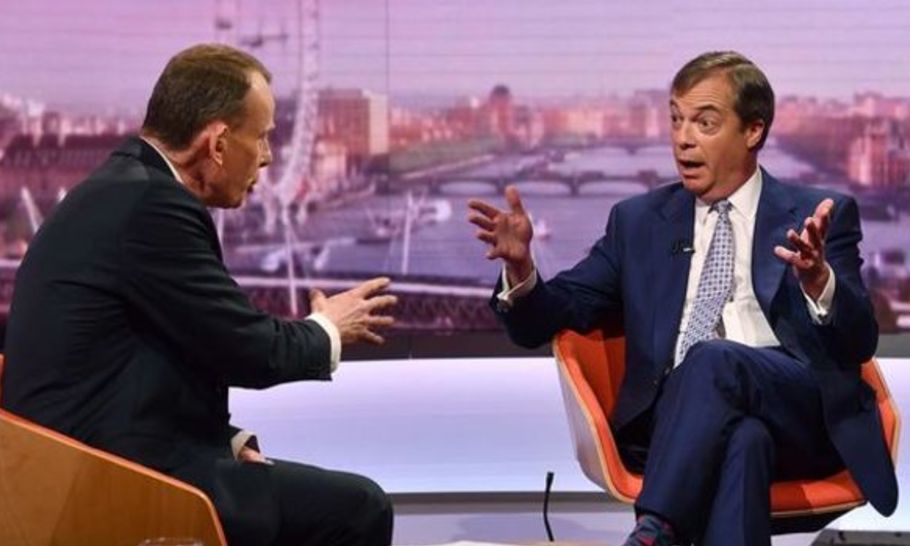Marr vs Farage: The culture war

The interview with Nigel Farage on The Marr Show on Sunday really got social media going. There were three schools of thought. First, Remainers and BBC presenters who thought Farage is a bully who can’t take serious questioning and was exposed as a lightweight.
Then there are Leavers and people who think the BBC has been biased against Brexit ever since the Referendum who thought Farage was right to attack Marr for his “absolutely ludicrous” line of questioning and the BBC for its “outrageous bias”.
Finally, there are those who support the right of presenters to robustly interview Farage but thought Marr and his producers had made a hash of it. This line is perhaps the most complicated so it’s worth exploring more closely, especially on the day that the great Brian Walden died.
Walden, presenter of Weekend World (ITV), for almost a decade, from 1977-86, was the doyen of political interviews. On Sunday Andrew Neil tweeted, “… A wonderful interrogator of politicians, especially on Weekend World. With Robin Day, he invented the British political interview style. Emulated but not matched to this day.”
The question is not whether Farage should be subjected to rigorous interviews. He is, after all one of the central figures in British politics, at the heart of the key debate of our time. Rather, the question is if you want to take on Farage how best to do it? Marr’s interview was an object lesson in how not to do it. Asking Farage questions about gun control, whether foreign HIV patients should be treated on the NHS or his views on Putin (misrepresented, by the way) does not get us to the heart of the debate. You can picture the scene: all those earnest BBC researchers and producers going through old cuttings and trawling the internet for incriminating quotes, or, rather, quotes which the liberal-leftist BBC find incriminating. That was never going to get anywhere because the 30% or so who are going to vote for Farage don’t care what the BBC find offensive. If BBC producers don’t like Farage’s views on gun control, all the better for Farage.
More to the point, it left Farage with a straight sets win. He was surely right to say these questions were trivial compared to the issues which are dividing the nation. Who, beyond New Broadcasting House, cares tuppence about what Farage said in an interview to GQ about Putin five years ago? In the coastal, rural and former industrial areas of Britain, Farage’s core constituency, this is all completely irrelevant.
The real issues are whether there should be a second referendum, is a No Deal Brexit workable, does Farage know his economics, and is his Brexit Party a single–issue party with nothing important to say about anything else? If they do win a few dozen seats, who might they make a pact with in the Commons? Might they make an electoral pact before a General Election, offering not to stand in the way of say, a Conservative pro- Hard Brexit party led perhaps by Boris Johnson?
Marr defended the interview, claiming that he was “trying to work out who you are” and “where the Brexit Party is going”. It just left Marr and the BBC News and Current Affairs teams looking woefully out of touch. Farage was surely right to claim that the BBC was “not prepared to talk about what is going on in this country today”.
This was at the heart of the interview, and Farage’s appearance on Question Time last week. Farage’s strength is his intuitive sense of the kind of England the BBC dislikes, people unhappy with diversity, identity politics and rapid change. These are the people Farage speaks to. On Question Time, broadcast from Northampton, the audience cheered Farage, laughed at his jokes. He gets them, they adore him. Anna Soubry, by contrast, was booed every time she spoke and Amber Rudd and some Labour MP I had never heard of, were greeted with complete silence throughout, much worse than being booed. Rudd must have realised at that moment that her chances of succeeding May were gone.
Marr’s interview and Question Time were a fascinating part of the culture wars dividing Britain and the BBC seems to have no idea how to deal with them – or Farage.





